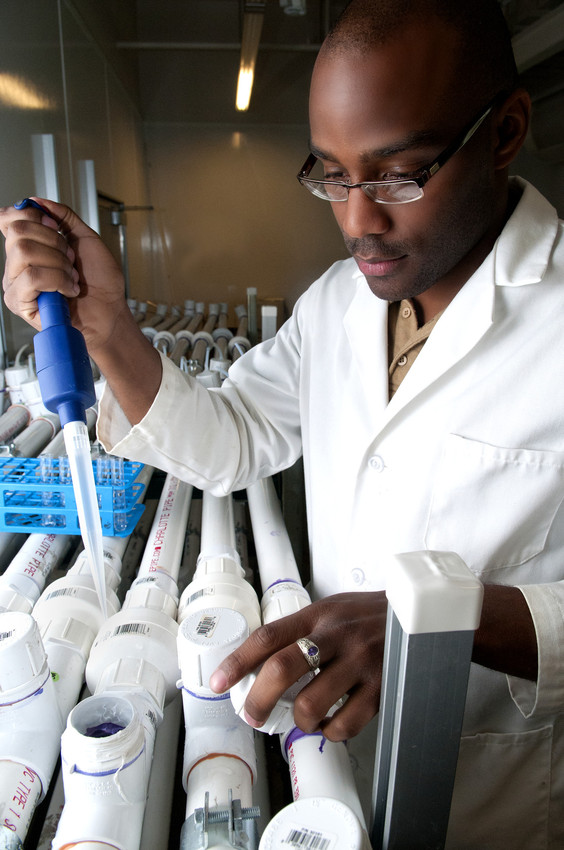[Student Interviews] Dr. Sheldon Masters

Dr. Sheldon Masters (CEE; Water IGEP) defended his PhD last week and his dissertation is titled “Lead and Copper Contamination in Potable Water: Impacts of Redox Gradients, Water Age, Water Main Pipe Materials and Temperature”. Having spent a considerable time here in Blacksburg, Sheldon has been an inspiration and a friend to many of us – both within the Water IGEP and outside. We sat down together to talk about his journey, his research and what he has gained at Virginia Tech. Future engineers – look out for some insights into graduate school and environmental research that Sheldon has to offer.
Q1 – How would you explain your research to your grandmother?
My research focuses on how drinking water quality changes once it leaves to treatment plant and gets to the consumer’s tap. More specifically, I look at the actors that influence the corrosion of lead pipes in distribution systems.
Q2 – Could you briefly talk about some of the implications your work has on current drinking water treatment practices and public health?
The Lead and Copper Rule (LCR) is an EPA regulation that is intended to target high-risk sampling sites and protect public health by reducing lead and copper levels in water. The regulation is currently being revised with the goal of better identifying sampling sites and developing better sampling protocols. My work examined factors that determine the location and timing of “high-risk” in the context of sampling site selection and consumer health risks. For example, past research has attributed higher incidence of childhood lead poisoning during the summer to increased soil and dust exposure. We have found that in field studies, lead in water can be as much as 5 times higher during the summer compared to the winter months which suggest that drinking water may also be a significant contributing factor to higher incidence of childhood lead poisoning during the summer.
Another significant concern associated with evaluating consumer exposure to lead is the variability in lead during sampling because of random detachment of particles that can pose an acute health risk. We have found that due to this variability, the current practice of collecting a single sample is unlikely to accurately characterize potential health risks.
Q3 – How would you describe your PhD journey to “young” folks considering Graduate School?
My PhD journey was a very circuitous one. I did my undergraduate degree in Mathematics at a liberal arts college and came to Virginia Tech hoping to do wastewater research. I found out really quickly wastewater wasn’t what I expected it to be and I considered doing water resources work instead but ended up finding my home doing drinking water quality research.
Q4 – How has your advisor and the department shaped you as a scientist and a human being?
They have helped me to move beyond simply using rote engineering and scientist principles to solve problems and instead recognize the societal implications of the work that we do. I have also developed an appreciation for the role of skepticism in science.
Q5 – Could you reflect on your Water IGEP experience and mention some specifics you got out of it?
The Water IGEP experience allowed me to work outside of my disciplinary silo which was exciting and challenging. As part of the IGEP program we have the opportunity to conduct research outside of primary field. For my independent study I conducted research in microbiology looking at the growth of denitrifying bacteria in distribution systems. This was particularly challenging since I have tried really hard to avoid anything related to microbiology since the 9th grade. I was able to learn various lab skills by working directly with PhD students and postdoctoral researchers. In the end, I developed a much greater appreciation of microbiology and a lot of the future research I hope to do is directly related to microbiology.
Q6 – Is this a great time to be an Environmental Engineer? Why so?
Absolutely! The most pressing environmental challenges today are more subtle, complex, global, and multigenerational than ever before. There are no simple solutions to these increasingly complex and uncertain set of social and scientific problems. However, because of the interdisciplinary nature of the field, environmental engineers are ideally suited to tackle the next generation of emerging environmental problems.
Q7 – What are some non-academic interests and hobbies that you like pursuing?
I enjoy running, playing poker and traveling even though I tend to have pretty bad luck when I travel.


